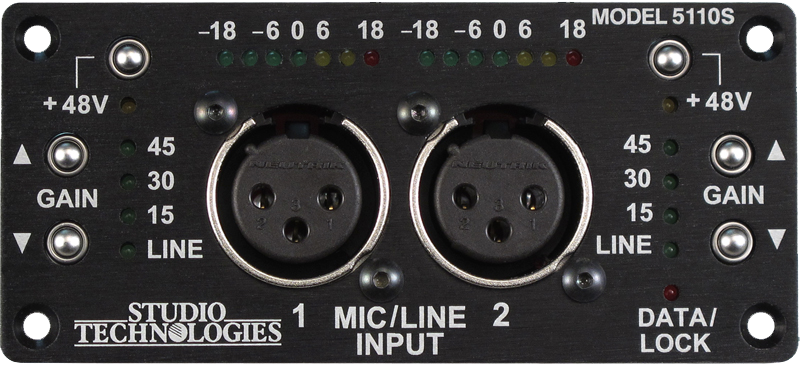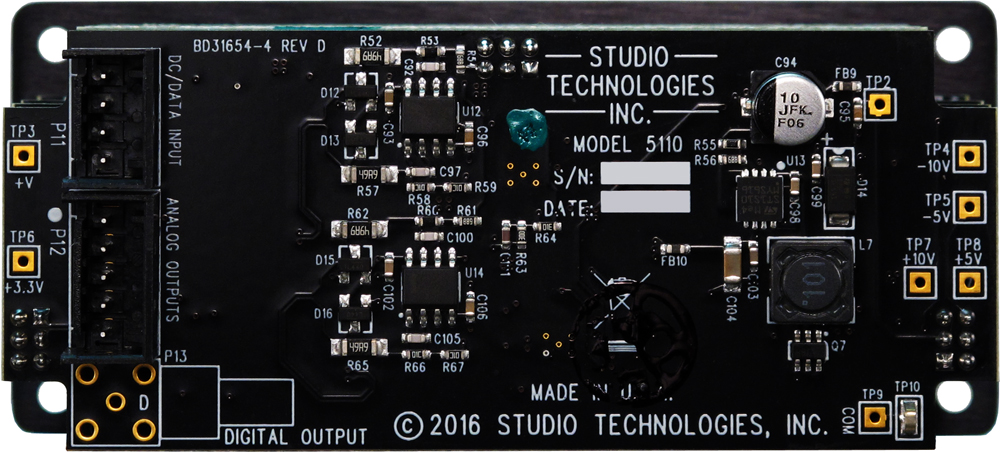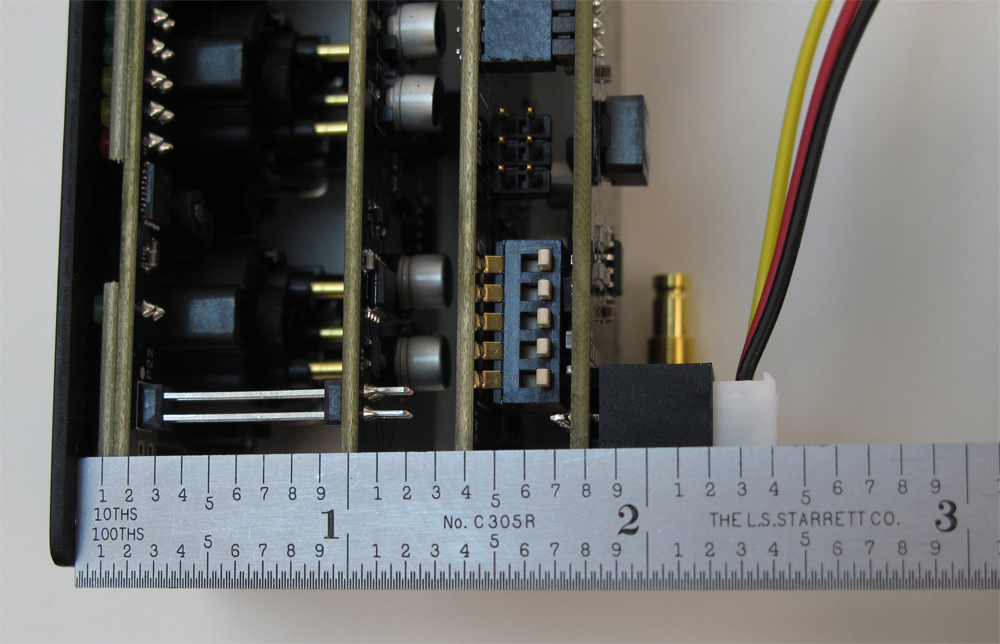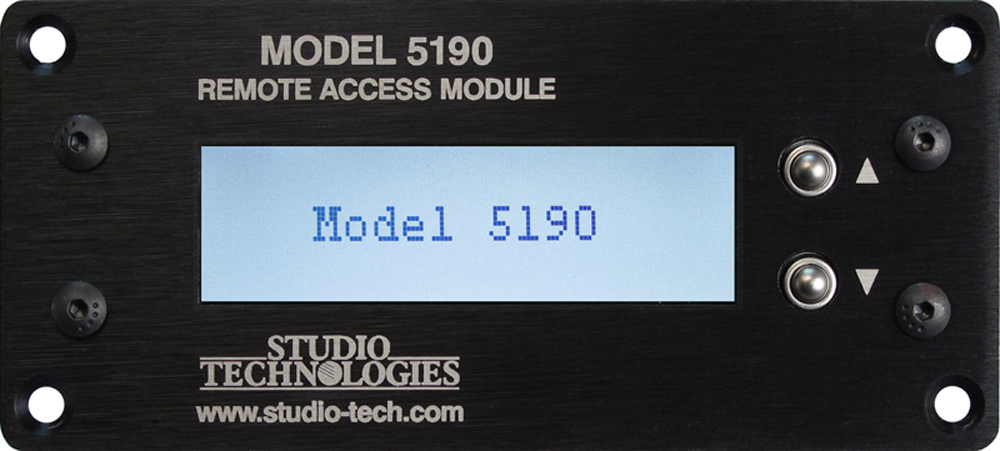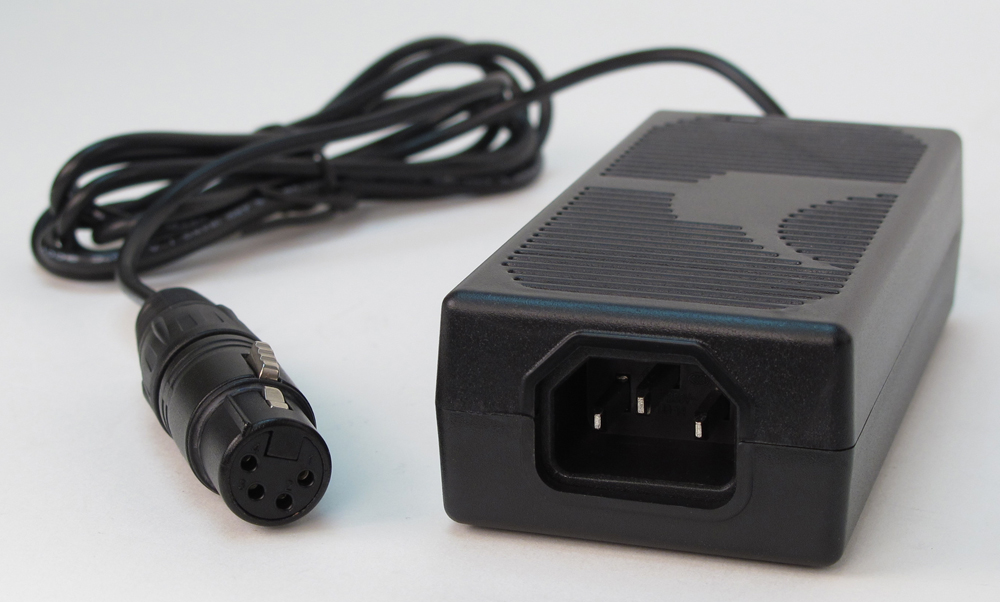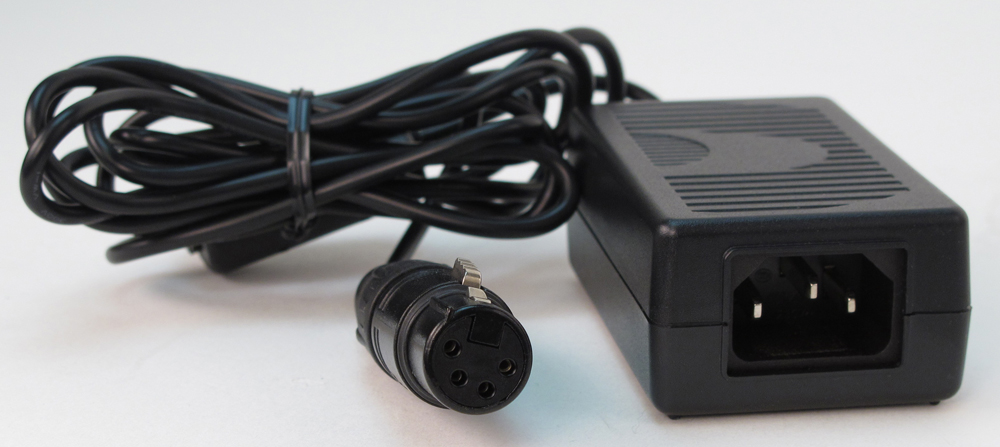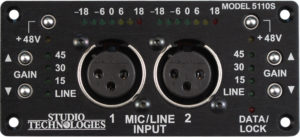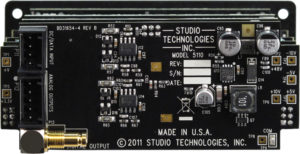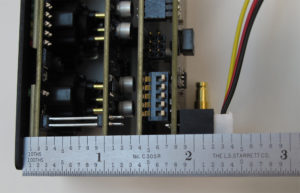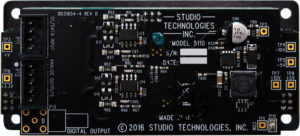The Model 5110 requires an external source of nominal 12 Vdc for operation. The acceptable input voltage range is 10 to 18 allowing a variety of power sources to be utilized. Internal power supply circuitry within the Model 5110 creates the voltages required for the analog and digital circuitry.
Standard connectors are used throughout the Model 5110. Input audio connections are made using gold-plated 3-pin female XLR connectors. A DIN 1.0/2.3 coaxial connector is used to interface with the digital audio output. The 2-channel analog audio outputs use a 5-position, 0.1-inch "header" connector. The DC power input and data bus signals use a 4-position, 0.1-inch header. Low-cost IDC (insulation displacement) mating connectors allow simple interconnection with the analog audio outputs, DC input, and local data bus signals.
For compliance with international broadcast audio level standards two versions of the Model 5110 are available. The Model 5110S supports the SMPTE® audio standards which have an analog audio reference level of +4 dBu and a digital audio reference level of –20 dBFS (SMPTE RP155). The Model 5110E supports applications that require European Broadcast Union (EBU) compliance where the analog audio reference level is 0 dBu and the digital audio reference level is –18 dBFS (EBU R68).
Applications
Applications for the Model 5110 include sports broadcasting booth packages, remote news gathering "fly-packs," stadium audio/video interface (I/O) locations, and government/corporate/performance space infrastructure projects. The number of Model 5110 modules used in a project can vary widely—from one to dozens. And in each case the Model 5110's performance will be completely "pro" with audio quality, reliability, and installation flexibility matching that of large-scale consoles, routers, and transport resources. Typical applications will find the Model 5110's analog and digital outputs being interfaced with inputs on fiber-optic transport modules, audio/video routers, and broadcast/production consoles.
Model 5110 Mic/Line Input Modules do not include a mounting enclosure or chassis. They are intended for mounting in custom 19-inch rack panels, equipment boxes, broadcast furniture, or other specialized settings. It is expected that integration firms will create applications that use Model 5110 modules as part of complete broadcast, production, corporate, and government solutions.
Mic/Line Inputs
Two microphone or line-level audio signals can be connected to the Model 5110's front panel XLR connectors. Using the front-panel pushbutton switches, the sensitivity of each input can be adjusted to one of four gain settings: line (0 dB), 15 dB, 30 dB, or 45 dB. To support high-performance microphones +48 V phantom power can be selected as required. Status LEDs are provided to display the current settings of the sensitivity and phantom power. A 7-segment LED level meter is also provided for each channel.
Six pushbutton switches on the Model 5110's front panel allow rapid selection of the input gain and phantom power on/off status. A simple button-press sequence allows the six pushbutton switches to be temporarily "locked out" to prevent accidental adjustment. This can be very useful in field applications, helping to ensure that unauthorized Model 5110 performance changes are not made. An LED indicator will light to alert users that pushbutton switch functionality has been disabled.
Analog and Digital Outputs
The Model 5110's audio performance is simply excellent. The low-noise, wide dynamic-range preamplifier sections ensure that input audio quality is preserved. The outputs of the mic-preamp circuitry are routed to two analog audio output sections. These provide line-level, balanced (differential), capacitor-coupled outputs.
The audio from the mic-preamps is also routed to high-performance analog-to-digital conversion (ADC) sections that support a sample rate of 48 kHz with a bit depth of 24. A precision voltage reference assists the ADC circuits in performing accurate conversion. The signals, now in the digital domain, are formatted into AES3 digital audio. This 2-channel digital bit stream is output as a 75 ohm unbalanced signal for direct connection into broadcast applications.
All audio inputs and outputs were carefully designed for use in permanent as well as field applications. Extensive filtering on the inputs minimizes the chance that radio frequency (RF) energy will interfere with audio input sources. Other components were included to address ESD ("static") and DC overload situations. The DC power input is protected from accidental polarity reversal.
Remote Control Capability
With an optional Model 5190 Remote Access Module up to 16 Model 5110 modules can be remotely monitored and controlled. Using the 5190's Ethernet interface personnel using a standard web browser will be able to access all the Model 5110's standard functions, including input sensitivity, phantom power on/off, and pushbutton switch lock out. In addition to the standard functions, the 5190 will allow more features to be utilized. These include expanded input sensitivity adjustment, channel text labeling, and module identification. A local 2-wire RS-485 data bus is used to interface the Model 5190 Remote Access Module with the one or more Model 5110 Mic/Line Input Modules.

